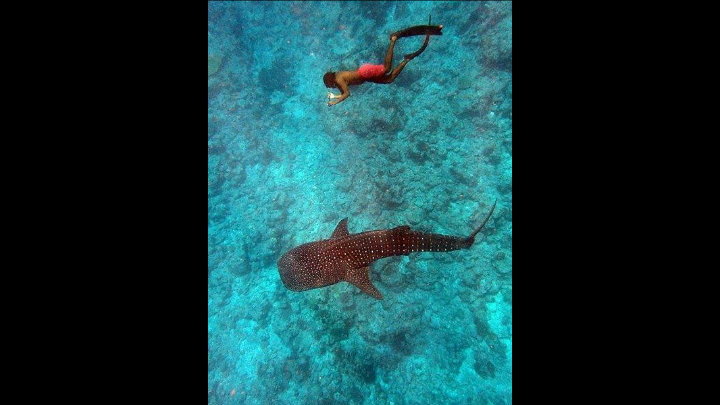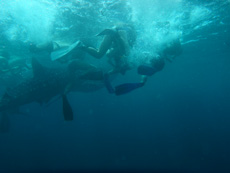The Maldives Whale Shark Research Programme (MWSRP) has had its research permit suspended by the ministry of fisheries and agriculture after complaints about the organisation’s research methods.
“The Divers’ Association and segments of the community complained to us that they were unhappy with the way the research was being conducted,” said Minister of State for Fisheries and Agriculture Dr Hussain Rasheed Hassan.
The ministry was concerned that the research “was not being conducted under the conditions issued”, he said, adding that “the decision was made in consultation with the ministry of tourism and community stakeholders.”
The MWSRP researchers have been involved in an ongoing dispute over the tagging of whale sharks with the Divers Association of the Maldives and a number of safari boat operators, who claim the practice is driving the rarely-seen species away from its habitat and threatening the livelihoods of safari and dive boat operators.
The MWSRP contends that the tagging is harmless and the whale sharks are being driven away by the throngs of boats and swimmers that converge every time a shark breaks the surface.
The dispute reached a head on 13 January when the researchers claimed their vessel was boarded and the crew threatened at knife-point.
MWSRP’s director Richard Rees said eight men from a liveaboard called ‘The Southern Cross’ came alongside the researchers’ vessel on 13 January.
“Their spokesman was armed with a knife,” Rees said. “It started out reasonable. We told him to ask his questions about our research and we would try to answer them.”
The researchers said in a statement that they tried to explain that tagging “does not lead to evasive behaviour in the sharks and is imperative to the conservation of the species”, and that moreover, “we have not tagged in South Ari atoll since May 2009.”
They said the man then accused them “of tagging 300 whale sharks. We explained that there are only 130 known individuals in the whole of the Maldives.”
“He then declared, ‘I have no interest in shark research. I don’t care if hundreds of people come here to see the sharks. I just care about my safari boat businesses.'”
Following the verbal stoush, Rees said the men demanded to see the vessel’s research permit and search the boat.
“We didn’t have the permit with us, so we phoned the ministry of fisheries and agriculture. [The ministry] said we had their full backing, after that the men became aggressive.”
A statement from the researchers claimed the man waved his knife at them and said: ‘I don’t care about the government or research. If you are in the area tomorrow I will bring more safari boats to fight with you and sink your dhoni. If you continue your research I will kill you all.'”
Rees said the man then slashed the banners identifying the ship as a research vessel and said worse would happen if the boat was in the same area the following day.
“It was a real nice experience for us; two of the people on board were on their first day as volunteers,” Rees said, adding that after the men left the vessel the researchers retreated to avoid inflaming the situation further.
“We remained calm and said we were going straight to the police. Then the Southern Cross’s sister ship MV Orion turned up and chased us down, said we didn’t have a permit and continued to harass us.”
Inspector Ahmed Shiyam from Maldives Police Service confirmed a complaint had been filed and that while no arrests had been made, the case was currently under investigation and had been referred to officers in Male.
“We can’t say anything yet. We will investigate and make recommendations to the relevant government authorities,” he said.
Rees said that it was not just the researchers who had been threatened by the liveaboards.
Ismail Mohamed from the water sports section at Diva Resort and Spa said congestion and poor behaviour around whale sharks in early January had led to one of the resort’s guests being hit in the head by a dive dhoni while he was swimming in the water.
“They can’t control the boat that close,” he said, adding that while the guest had escaped with bruising and swelling and was filing a complaint with the resort, a lot of whale sharks also suffered from propeller damage because of the boats getting too close.
The proximity of the reef break near the popular whale sighting spot also meant “that if [other vessels] crash into me and there’s a problem [with the engine], my boat will crash on the reef and I will lose it.”
The crew of some liveaboards had also shown poor behaviour to some of Diva’s guests, “throwing dive weights and showing their naked behinds, which is disappointing behaviour for Maldivians. One guest was very angry, I think he also made a complaint.”
Tagging controversy
Ahmed Risheen from the advisory board of the Divers Association of the Maldives said the tension had been building between the vessels and the researchers because of their tagging methods.
“The sharks are disappearing because they are tagging them and taking samples. It’s a threat [to the shark’s] environment – because of the research there are less whale sharks,” Risheen said.
“They’ve been working for only three years, Maldivians have been watching sharks here for 15 years. We have a really good code of conduct here.”
Risheen also accused the MWSRP of tagging in front of guests, an activity Rees denied.
“We have a policy not to tag when tourists or boats are in the area, because we understand what their responses are going to be,” he replied.
The tagging itself was harmless to the animal, he said, “and the majority do not react. Some swim away, but we catch up and take photos to make sure tagging occurred properly.”
Allegations that researchers had boasted on their website that tagging the sharks was “like drinking coffee on a roller-coaster” were false, the researchers said.
“It is very disappointing that people believe hearsay. Our website is readily available for anyone to read and to be able to contact the MWSRP to obtain the correct information.”
The tagging process was “essential to learn more about them,” Rees insisted. The organisation’s research had revealed that the sharks travelled “enormous distances but come back to the [Maamigilli] area over and over again. “This is important because if the shark goes into international waters there are conservation implications – they are not protected outside the Maldives.”
The tags also recorded depth and temperature, allowing the reseachers to plot the whale sharks’ vertical habitats.
“The sharks spend an awful lot of time very deep and only surface infrequently, often at night. It’s amazing we get sightings at all – this kind of information is of huge value to the tourist industry.”
Opportunities to see whale sharks were unpredictable and “very limited”, he said.
“A lot of liveaboards guarantee ‘whale shark encounters’ which is ludicrous. There’s huge pressure when there are no sharks and they blame it on our research program – we have data that proves this is not the case.”
Risheen insisted that researchers’ conduct in the Maamigilli area, “the only place where you’re guaranteed to see whale sharks”, was affecting vessels’ “businesses and livelihoods.”
As for the attack on the researchers, “I heard that story, and I really regret that a Maldivian diver has done that – we’re trying to track this guy down also. We’ve had a lot of calls from Ari atoll asking us to do something about [the situation] and we’ve been trying, but apparently we were a little late.”
Commercialisation
Risheen also claimed the MWSRP were commercialising their research “through a contract with Conrad [Rangali Island] Resort.”
Dr Hussain Rasheed Hassan said the ministry was also concerned about this, “as the terms and conditions [of the research permit] state that the research must not be exploited for commercial advantage.”
“I visited their website and the researchers are asking people to donate money to sponsor whale sharks – nobody can sponser a whale, nobody has the right except the Maldives government. I’m very concerned about somebody saying they can sponsor our animals.”
Rees said the MWSRP was meeting with the ministry on 30 January to explain the program and the tagging methods that had been used.
“We will also be making our findings available on our website,” he said.
Image provided by the MWSRP.
Likes (0)Dislikes
(0)Dislikes (0)
(0)
 (0)Dislikes
(0)Dislikes (0)
(0)

